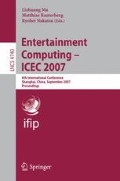Abstract
We are exploring an application for a novel direction in humancomputer interaction named ’cultural computing’, which aims to provide a new medium for cultural translation and unconscious metamorphosis. The main objective of this project is to create an interactive experience that encourages people in Western culture to reflect on their self-concept. In Western culture the self-concept is generally based on conscious perception of the self. Over centuries the book ’Alice’s Adventures in Wonderland’ got continuous attention, and therefore seems to be a promising narrative to address issues like logic, rationality, and self. The user in the role of Alice will go through an interactive experience and meets a Caterpillar, who questions the participant’s whereabouts of his/her self-concept. To determine the effect of this experience, we discuss a method that measures changes in a person’s implicit self-concept for we predict that the experience will have an unconscious effect towards individual metamorphosis. Using the ’implicit association test’ (IAT) we could find a significant effect in the hypothesized direction.
Chapter PDF
Similar content being viewed by others
References
Carroll, L.: Alice’s adventures in Wonderland. Macmillan, London (1865)
Bartneck, C.: Negotiating with an embodied emotional character. In: Forzlizzi, J., Hamington, B., Jordan, P.W. (eds.) Design for Pleasurable Products, pp. 55–60. ACM Press, Pittsburgh (2003)
Brehm, S.S., Kassin, M.S., Fein, S.: Social psychology, 4th edn. Houghton Mifflin, Boston (1999)
Deikman, A.J.: The observing self: mysticism and psychotherapy. Beacon Press (1983)
Fogg, B.J.: Persuasive technology, using computers to change what we think and do. Morgan Kaufmann Publishers, San Francisco (2003)
Gallagher, S., Shear, J. (ed.): Models of the self. Imprint Academic, Exeter (1999)
Greenwald, A.G., McGhee, D.E., Schwartz, J.K.L.: Measuring individual differences in implicit cognition: The Implicit Association Test. Journal of Personality and Social Psychology 74(6), 1464–1480 (1998)
Greenwald, A.G., Farnham, S.D.: Using the Implicit Association Test to measure self-esteem and self-concept. Journal of Personality and Social Psychology 79(6), 1022–1038 (2000)
Heiligman, D.: From caterpillar to butterfly. A Let’s-Read-and-Find-Out Science Book (1996)
Jung, C.G.: Man and his Symbols. Doubleday Garden City, New York (1969)
Keesing, R.M.: Theories of culture. Annual Review of Anthropology 3, 73–97 (1974)
Kinney, A.: The intellectual-insight problem: implications for assessment and Rational-Emotive Behavior Therapy. Journal of Contemporary Psychotherapy 30(3), 261–272 (2000)
Kitayama, S., Markus, H.R., Matsumoto, H., Norasakkunkit, V.: Individual and collective processes in the construction of the self: self-enhancement in the United States and self-criticism in Japan. Journal of Personality and Social Psychology 72(6), 1245–1267 (1997)
Kooijmans, T., Rauterberg, M.: Advice from a caterpillar: an application for cultural computing about the self. In: Harper, R., Rauterberg, M., Combetto, M. (eds.) ICEC 2006. LNCS, vol. 4161, pp. 5–8. Springer, Heidelberg (2006)
Kroeber, A.L., Kluckhohn, C.: Culture: A critical review of concepts and definitions. Peabody Museum, Cambridge, Massachusetts (1952)
Leclerc, J.: The unconscious as paradox: impact on the epistemological stance of the art psychotherapist. The Arts in Psychotherapy 33, 130–134 (2006)
Marzano, S.: Ambient culture. In: Aarts, E., Encarnação, J. (eds.) True visions- the emergence of ambient intelligence, pp. 35–52. Springer, Heidelberg (2006)
Nakatsu, R., Rauterberg, M., Salem, B.: Forms and theories of communication: from multimedia to Kansei mediation. Multimedia Systems 11(3), 304–312 (2006)
Nass, C., Brave, S.: Wired for Speech: How voice activates and advances the human-computer relationship. MIT Press, Cambridge (2005)
Nisbett, R.E., Peng, K., Choi, I., Norenzayan, A.: Culture and systems of thought: Holistic versus analytic cognition. Psychological Review 108(2), 291–310 (2001)
Nisbett, R.E., Masuda, T.: Culture and point of view. PNAS 100(19), 11163–11170 (2003)
Rauterberg, M.: From personal to cultural computing: how to assess a cultural experience. In: Kempter, G., von Hellberg, P. (eds.) uDayIV–Information nutzbar machen, pp. 13–21. Pabst Science Publisher, Lengerich (2006)
Rauterberg, M.: Usability in the future –explicit and implicit effects in cultural computing. In: Heinecke, A.M., Paul, H. (eds.) Mensch & Computer 2006: Mensch und Computer im StrukturWandel, pp. 29–36. Oldenbourg Verlag, München (2006)
Rauterberg, M.: How to assess the user’s experience in cultural computing. In: Bosenick, T., Hassenzahl, M., Müller-Prove, M., Peissner, M. (eds.) Usability Professionals 2006, Fraunhofer Informationszentrum Raum und Bau, pp. 12–17 (2006)
Reeves, B., Nass, C.: The Media Equation: How people treat computers, television, and new media like real people and places. Cambridge University Press, New York (1996)
Shamdasani, S.: Unconscious. In: Odijk, E., Syre, J.-C., Rem, M. (eds.) PARLE 1989. LNCS, vol. 365, p. 1921. Springer, Heidelberg (1989)
Tosa, N., Nakatsu, R.: Interactive Comedy: Laughter as the next intelligence system. In: Proceedings International Symposium on Micromechatronics and Human Science, pp. 135–138. IEEE Computer Society Press, Los Alamitos (2002)
Tosa, N.: Interactive Comedy. Journal of the Institute of Image Information and Television Engineers 57(4), 454–455 (2003)
Tosa, N., Matsuoka, S.: Cultural computing: ZENetic computer. In: ICAT 2004. Proceedings of the 14th International Conference on Artificial Reality and Tele-existence, pp. 75–78, Korea Advanced Institute of Science and Technology, Korea (2004)
Tosa, N., Matsuoka, S.: ZENetic Computer: Exploring Japanese Culture. Leonardo 39(3), 205–211 (2006)
Yamaoka, F., Kanda, T., Ishiguro, H., Hagita, N.: Lifelike behavior of communication robots based on developmental psychology findings. In: Proceedings IEEE International Conference on Humanoid Robots, pp. 406–411. IEEE Computer Society Press, Los Alamitos (2005)
(Retrieved on March 23, 2007), from http://en.wikipedia.org/wiki/Culture
Test of Unconscious Identification (TUI), http://jamiep.org/mod/tui/view.php?id=154&do=test
The ALICE project, http://www.alice.id.tue.nl/
Author information
Authors and Affiliations
Editor information
Rights and permissions
Copyright information
© 2007 IFIP International Federation for Information Processing
About this paper
Cite this paper
Kooijmans, T., Rauterberg, M. (2007). Cultural Computing and the Self Concept: Towards Unconscious Metamorphosis. In: Ma, L., Rauterberg, M., Nakatsu, R. (eds) Entertainment Computing – ICEC 2007. ICEC 2007. Lecture Notes in Computer Science, vol 4740. Springer, Berlin, Heidelberg. https://doi.org/10.1007/978-3-540-74873-1_21
Download citation
DOI: https://doi.org/10.1007/978-3-540-74873-1_21
Publisher Name: Springer, Berlin, Heidelberg
Print ISBN: 978-3-540-74872-4
Online ISBN: 978-3-540-74873-1
eBook Packages: Computer ScienceComputer Science (R0)




